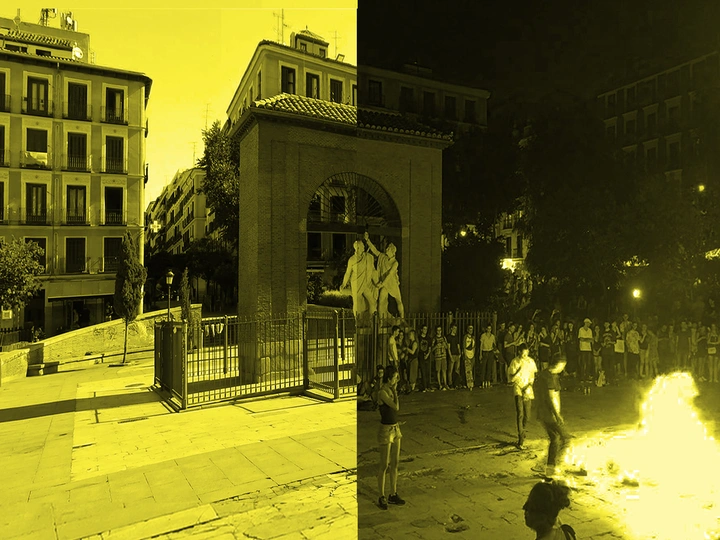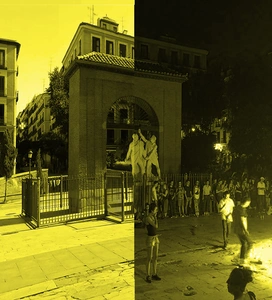CITY AFTER HOURS

Elena Agudo Sierra holds a master’s in architecture from the University Polytechnic of Madrid with a final project entitled “Ashram of the 5 senses. Rehabilitation project of the Deaf-mute school”, which got the high distinction in April 2017. Elena’s work has been awarded by the Madrid College of Architects 2017, exhibited at the Spanish Pavilion at the Venice Biennale 2020, and selected by the Future Architecture European Platform 2018 for young creatives. During this period, she was invited as a jury guest at RBRC Studio of Planning at CEPT University (India) and Studio Year-1 of ALICE Group at EPFL (Switzerland).
Currently, Elena is an Assistant Researcher at Louvain research institute for Landscape, Architecture, and the Built environment (UCLouvain), focusing on her research line "CITY AFTER HOURS” investigating theoretical concepts and relevant practical cases concerning the management, design, and experience of cities at night using geographic and digital tools. Projects include: “CITY AFTER HOURS: An investigation of the city and the night by mapping lighting infrastructure in public spaces in BCR” granted with the San Fernando Royal Academy of Fine Arts-COAM Architecture Foundation Scholarship 2021 (Spain), and “CITY AFTER HOURS -ULI4SUM: Urban Lighting Infrastructure for Sustainable Urban Mobility in BCR” granted in 2023 by Innoviris (Belgium). She also had collaborated on projects as “Brussels Street Greenery and Citizen Comfort Evaluation” (Louvain4Cities) and “3D CIT-IS” (Innoviris), exploring urban infrastructures through digital tools from a citizen-centric perspective. Simultaneously, she assists on academic courses at the Department of Architecture, Architectural Engineering, and Urban Planning (UCLouvain).
Elena combines academia and practice, developing sustainable urban projects and plans such as “PCI. Eco-industrial park” in collaboration with urban stakeholders and awarded with CONAMA Sustainable National Prize 2019 (Spain).
The appointment of Amy Lamé, American performer and well-known advocate for the LGTBIQ+ movement, by Mayor Sadiq Khan as London's Night Czar in 2016 has focused the attention of policymakers, economists, academics, and others. Not only because of the importance of the nighttime economy in the 24/7 society of which we are a part, but in the politics of the city and its spaces where all type of activities, normative and non-normative, take place.
In this context, CITY AFTER HOURS delves into relevant theoretical concepts and case studies from the perspective of managing, designing, and experiencing cities at night. This line of enquiry is carried out by three discursive ways:
* ENVIRONMENT: Lighting Infrastructure and Pollution (completed). This track was completed through the project “CITY AFTER HOURS: An investigation of the city and the night by mapping lighting infrastructure in public spaces in Brussels”. It explores the night and its environmental dimension through the design and spatial management of public lighting.
* MOBILITY: Body Infrastructure and Safety (in progress). This line of research is being developed through the project “CITY AFTER HOURS-ULI4SUM: Urban Lighting Infrastructure for Sustainable Urban Mobility in BCR”. It assesses the built environment, particularly street lighting, and its impact on the safety and security of sustainable mobility users, especially for female pedestrians.
* ECONOMY: Leisure-Care Infrastructure and Workers (planned). This pathway will be pursued in the future, examining the spatial dimension of the nighttime economy from the perspective of overlooked workers by public administrations.
CITY AFTER HOURS proposes an interdisciplinary approach introducing methodologies from urban, social and environmental sciences -geospatial analysis, counter cartography, immersive media technologies, participatory experimental campaigns, and biometric sensors- to map the nighttime city from a new perspective.
